|
|
|
Sort Order |
|
|
|
Items / Page
|
|
|
|
|
|
|
| Srl | Item |
| 1 |
ID:
117981
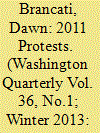

|
|
|
|
|
| Publication |
2013.
|
| Summary/Abstract |
In 2011, throngs of protesters took to the streets, often at great risk to their lives, to challenge the results of undemocratic elections across the globe-in Bahrain, Benin, Egypt, Haiti, Morocco, Nicaragua, Nigeria, and Russia. Outside of elections, pro-democracy protests also took place in 2011 in Cameroon, Libya, Malaysia, Swaziland, Syria, Tunisia, and Yemen, among other countries.
|
|
|
|
|
|
|
|
|
|
|
|
|
|
|
|
| 2 |
ID:
051470
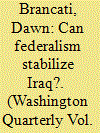

|
|
|
| 3 |
ID:
073979
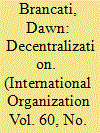

|
|
|
|
|
| Publication |
2006.
|
| Summary/Abstract |
Political decentralization is widely believed to reduce ethnic conflict and secessionism in the world today. Yet decentralization is more successful in reducing conflict and secessionism in some countries than in others. In this article, I explore why this difference occurs. I demonstrate using a statistical analysis of thirty democracies from 1985 to 2000 that decentralization may decrease ethnic conflict and secessionism directly by bringing the government closer to the people and increasing opportunities to participate in government, but that decentralization increases ethnic conflict and secessionism indirectly by encouraging the growth of regional parties. Regional parties increase ethnic conflict and secessionism by reinforcing ethnic and regional identities, producing legislation that favors certain groups over others, and mobilizing groups to engage in ethnic conflict and secessionism.
|
|
|
|
|
|
|
|
|
|
|
|
|
|
|
|
| 4 |
ID:
079525
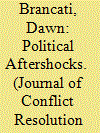

|
|
|
|
|
| Publication |
2007.
|
| Summary/Abstract |
Although many scholars, policy makers, and relief organizations suggest that natural disasters bring groups together and dampen conflicts, earthquakes can actually stimulate intrastate conflict by producing scarcities in basic resources, particularly in developing countries where the competition for scarce resources is most intense. Capitalizing on a natural experiment design, this study examines the impact of earthquakes on intrastate conflict through a statistical analysis of 185 countries over the period from 1975 to 2002. The analysis indicates that earthquakes not only increase the likelihood of conflict, but that their effects are greater for higher magnitude earthquakes striking more densely populated areas of countries with lower gross domestic products as well as preexisting conflicts. These results suggest that disaster recovery efforts must pay greater attention to the conflict-producing potential of earthquakes and undertake certain measures, including strengthening security procedures, to prevent this outcome from occurring
|
|
|
|
|
|
|
|
|
|
|
|
|
|
|
|
| 5 |
ID:
105915
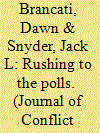

|
|
|
|
|
| Publication |
2011.
|
| Summary/Abstract |
In the post-cold war period, civil wars are increasingly likely to end with peace settlements brokered by international actors who press for early elections. However, elections held soon after wars end, when political institutions remain weak, are associated with an increased likelihood of a return to violence. International actors have a double-edged influence over election timing and the risk of war, often promoting precarious military stalemates and early elections but sometimes also working to prevent a return to war through peacekeeping, institution building, and powersharing. In this article, we develop and test quantitatively a model of the causes of early elections as a building block in evaluating the larger effect of election timing on the return to war.
|
|
|
|
|
|
|
|
|
|
|
|
|
|
|
|
| 6 |
ID:
190757
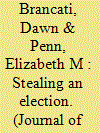

|
|
|
|
|
| Summary/Abstract |
Political actors often resort to electoral violence to gain an edge over their competitors even though violence is harder to hide than fraud and more likely to delegitimize elections as a result. Existing explanations tend to analyze violence in terms of the same factors as fraud, or to treat violence as a means of last resorts given its overtness. We introduce a novel explanation that does neither, arguing that political actors often use violence for the very reason that it is hard to hide. Its overtness, we argue, allows political actors to observe whether the agents they enlist to manipulate elections for them do so and reduces these agents’ likelihood of shirking in turn. We develop our argument through a formal model showing that electoral monitors, by exacerbating problems of moral hazard (shirking), can induce actors to increasingly turn to violence and use process tracing to examine the implications of this model through the example of Egypt.
|
|
|
|
|
|
|
|
|
|
|
|
|
|
|
|
| 7 |
ID:
124140
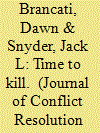

|
|
|
|
|
| Publication |
2013.
|
| Summary/Abstract |
Elections constitute a fundamental element of postconflict peacebuilding efforts in the post-cold war era and are often held soon after conflicts end. Yet, the impact of early elections on postconflict stability is the subject of sharp debate. While some argue that early elections facilitate peace agreements, hasten democratization, and ensure postconflict stability, others suggest that they undermine genuine democracy and spark a renewal in fighting. In this study, we argue that holding elections soon after a civil war ends generally increases the likelihood of renewed fighting, but that favorable conditions, including decisive victories, demobilization, peacekeeping, power sharing, and strong political, administrative and judicial institutions, can mitigate this risk. We attempt to reconcile the extant qualitative debate on postconflict elections through a quantitative analysis of all civil wars ending in the post-World War II period.
|
|
|
|
|
|
|
|
|
|
|
|
|
|
|
|
| 8 |
ID:
170202
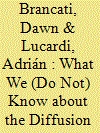

|
|
|
| 9 |
ID:
170197
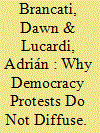

|
|
|
|
|
| Summary/Abstract |
One of the primary international factors proposed to explain the geographic and temporal clustering of democracy is the diffusion of democracy protests. Democracy protests are thought to diffuse across countries, primarily, through a demonstration effect, whereby protests in one country cause protests in another based on the positive information that they convey about the likelihood of successful protests elsewhere and, secondarily, through the actions of transnational activists. In contrast to this view, we argue that, in general, democracy protests are not likely to diffuse across countries because the motivation for and the outcome of democracy protests result from domestic processes that are unaffected or undermined by the occurrence of democracy protests in other countries. Our statistical analysis supports this argument. Using daily data on the onset of democracy protests around the world between 1989 and 2011, we find that in this period, democracy protests were not significantly more likely to occur in countries when democracy protests had occurred in neighboring countries, either in general or in ways consistent with the expectations of diffusion arguments.
|
|
|
|
|
|
|
|
|
|
|
|
|
|
|
|
|
|
|
|
|